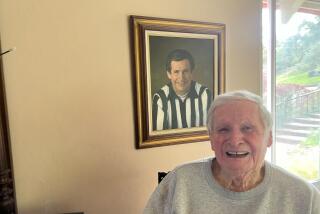A winning ticket
- Share via
Although best known for popular youth-oriented TV shows such as “Smallville” and “What I Like About You,” Mike Tollin and his producing partner, Brian Robbins, also have carved a niche in Hollywood for stories set amid the sports world.
There’s baseball (the feature films “Hardball,” “Summer Catch” and documentary “Hank Aaron: Chasing the Dream”), basketball (the documentary “Hardwood Dreams,” cable TV’s “Slamball” and the new hoops-themed TV show “One Tree Hill”) and football with the feature film “Varsity Blues.”
A Philadelphia-born sports nut still coping with the infamous 1964 Phillies collapse, Tollin recently directed “Radio” for Revolution Studios and Columbia Pictures. The film, which opened last month, was inspired by a 1996 Sports Illustrated story Tollin read about James Robert Kennedy, a developmentally disabled man nicknamed “Radio” in Anderson, S.C., who blossomed and became something of a folk hero when he was allowed to help out with a high school football team. The film stars Cuba Gooding Jr. as Radio and Ed Harris as his mentor, Coach Harold Jones.
What is it about sports movies that allow you to tell a larger story?
Brian and I have done 10 films now, five of which have at least a sports backdrop. “Radio” isn’t a conventional sports movie in that it’s not about does the team win the big game in the end. Having said that, sports is a great access point for the audience. It provides structure for a filmmaker. You know what’s at stake, you know who the good guys are. You know who to root for.
What drew you to Radio’s story?
It was a story that had resonance for me in large part because of a film I made six years earlier. We went to Africa with a group of 12 California Special Olympians, climbed Mt. Kilimanjaro and at 16,000 feet we got hit by a monsoon. The so-called mentally challenged athletes behaved much more admirably and much more courageously and taught us all something.
You make a point of saying the film “is inspired by” a true story and is not verbatim. Why?
It’s a story that happened over four decades. For purposes of telling a dramatic story, we decided to do it in one year from fall through spring. Obviously we had to use composite characters and had to invent some plot points, but the essence for me is capturing the relationships, the magic and the essence of what happened in this town. The coach’s wife came up to me after a screening and said, “How do you get so close to the story without knowing what really went on?”
How do you do that?
We spent quote a lot of time on it. For the sake of authenticity, we went to Coach Jones’ attic and got his old game films and his old playbook. The plays Ed Harris has drawn up on 3X5 cards is from the same playbook for the ’70 teams.
You auditioned 1,500 young men as players for the football team. Did you feel like a head coach having to cut them?
We had a guy, Mark Ellis, who had done the sports in our other movies. He treats it as if he’s putting a real team together to win a championship. He lines the guys up on the first day and says if you were not All-League or the best player on your high school team you should not be here. He puts together a playbook. It’s 80 pages thick. Every single play is choreographed. When it’s 4 in the morning with 5,000 extras in 25-degree weather and you run the reverse, they had better run it right.
How has the real Radio reacted to this?
He has little cards that say “Radio: Movie Star” that he hands out with his autograph. He’s just loving the ride.
-- James Bates
More to Read
Go beyond the scoreboard
Get the latest on L.A.'s teams in the daily Sports Report newsletter.
You may occasionally receive promotional content from the Los Angeles Times.










